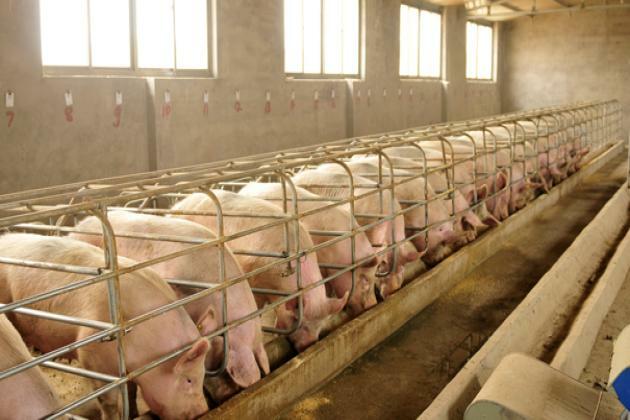US Farmers Hope for US-China Trade Deal as Pork, Soybean Tariffs Ease
Voice of America
17 Sep 2019, 07:12 GMT+10

- Thomas Titus handles all the challenges of running his sprawling Elkhart, Illinois, farm, but lately, he isn't making a lot of money doing it.
- "We're producing corn and we're producing soybeans at below cost of production almost, and we're raising pigs at below cost of production," he told VOA, his voice competing with the sou ...
- It's not unusual for farmers to diversify their products but Titus says his pork operation isn't typical.
ELKHART, IND. - Thomas Titus handles all the challenges of running his sprawling Elkhart, Illinois, farm, but lately, he isn't making a lot of money doing it.
"We're producing corn and we're producing soybeans at below cost of production almost, and we're raising pigs at below cost of production," he told VOA, his voice competing with the sounds of hundreds of hogs housed in one of several nearby buildings. "We're in a challenging time whenever we get to the end of the year and we need to shore up some of those books."
It's not unusual for farmers to diversify their products but Titus says his pork operation isn't typical.
"We're somewhat of a rarity given our size. We're a 600-sow farrow-to-finish farm, so we raise pigs from birth up to market weight, so our size and what we do is a little more dynamic and diverse," he said.
Dependent on trade
In total, Titus raises about 12,000 pigs a year, many sent to the international market. He said much of his profit comes from such exports.
"One in every four pigs we raise goes to a foreign country of some kind, so we are extremely dependent on those positive trade negotiations and trade agreements for the success of our business."
One key buyer of U.S. pork is China, the world's largest importer, which is dealing with a major outbreak of Asian swine fever. As a result, China's pig population has decreased about 20%. Some estimates indicate China has culled more than 1 million pigs.
When it was needed most, American pork was more expensive than other sources because of steep tariffs imposed by the Chinese government, one of many Beijing imposed on American agricultural products amid a protracted trade war with Washington.
Now, China has announced a tariff exemption on U.S.-produced pork, relaxing a punishing 72% duty.
Trade war damage done
But economic damage has been done to the U.S. pork industry.
"We've lost about $1 billion worth of pork sales, or what Iowa State University has put out a study, $8 per hog is what it's cost us on the tariffs," said Karl Setzer, a commodity risk analyst with AgriVisor, who added that even before tariffs, China tended to spread out its purchases.
"China doesn't like to marry themselves to one commodity supplier, be it pork, beef, soybeans, whatever it is," he said.
So when American pork couldn't compete on price because of tariffs, Setzer said China turned more to other suppliers, like the European Union and Brazil.
"Brazil has seen their trade jump 5% in the last year. The trade war isn't helping us at all. We would likely have a bigger share because we are a bigger pork producer, but it comes down to value and what we are willing to sell our pork for," Setzer said. "They're (China) still showing interest in our offerings, but when you look at all the other factors, the trade war on a whole is probably one of the worst ones we've been in."
It's unclear how much China will increase purchases now that certain tariffs, including those on pork and soybeans, are removed.
Supporting Trump, not tweets
And even though, as with other farmers, Titus has taken direct hits for the price of almost everything he is producing on his farm as the trade war continues, he said he still supports President Donald Trump, but would like to see fewer trade negotiations happen via presidential tweet.
"It takes three tweets and this market takes a crash," he said.
Which is why Titus hopes upcoming face-to-face negotiations between the United States and China produce tangible, long-term results, creating some stability for commodity markets, and ultimately his bottom line.
Source: VOA
 Share
Share
 Tweet
Tweet
 Share
Share
 Flip
Flip
 Email
Email
Watch latest videos
Subscribe and Follow
Get a daily dose of Breaking Property News news through our daily email, its complimentary and keeps you fully up to date with world and business news as well.
News RELEASES
Publish news of your business, community or sports group, personnel appointments, major event and more by submitting a news release to Breaking Property News.
More InformationBusiness
SectionBrazil aims to restart poultry trade after bird flu clearance
SAO PAULO, Brazil: Brazil is taking confident steps to restore its dominance in global poultry exports after declaring its commercial...
U.S. stocks restricted by tensions in Middle East
NEW YORK, New YorK - U.S. stocks closed mixed on Friday, with gains and losses modest, as investors and traders weighed up the escalation...
US consumers cut back after early surge ahead of Trump tariffs
WASHINGTON, D.C.: Retail sales dropped sharply in May as consumer spending slowed after a strong start to the year, primarily due to...
Mitsubishi joins automakers raising prices after import tariffs
WASHINGTON, D.C.: Mitsubishi Motors is the latest automaker to raise prices in the United States, joining a growing list of car companies...
Lilly makes $1.3 billion move to expand into gene-edited heart drugs
INDIANAPOLIS, Indiana: Eli Lilly is making a bold play in cardiovascular gene therapy, announcing plans to acquire its partner Verve...
New Zealand PM seeks stronger ties with China amid security talks
BEIJING/WELLINGTON: New Zealand's Prime Minister Christopher Luxon commenced his visit to China on June 17, seeking to strengthen trade...
Construction
SectionDemonstrators in Dublin decry homes as investment assets, not shelter
DUBLIN, Ireland: In a significant demonstration outside Leinster House in Dublin, hundreds of housing protesters voiced their frustration...
Feature: El Salvador rides waves to a better future with Surf City initiative
Through Surf City, El Salvador has demonstrated how a sport can serve as the engine of economic growth and social transformation. Today,...
The Great Australian Dream now belongs to landlords
With average house prices rocketing to over a million dollars, the Australian Dream has lost its democratic ethos and is fast becoming...
Family of missing CU Boulder student found dead offering reward for information
Family of missing CU Boulder student found dead offering reward for information
Barry Morphew indicted on murder charge in death of Suzanne Morphew
Barry Morphew indicted on murder charge in death of Suzanne Morphew













